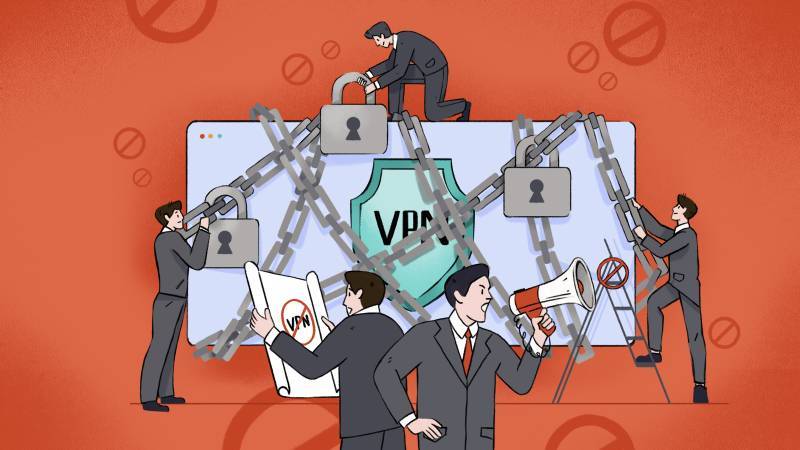
The country is embroiled in a heated debate following the issuance of a fatwa (Islamic religious edict) by the Council of Islamic Ideology (CII), declaring the use of Virtual Private Networks (VPNs) as ‘haram’ (forbidden under Islamic law). The news, widely reported on mainstream and social media, has left many perplexed, questioning the connection between VPN usage and Islamic teachings.
Pakistan's Council of Islamic Ideology (CII) has been under tremendous pressure after declaring the use of VPNs to access blocked content as "un-Islamic." The backlash came from various quarters, including digital rights activists, lawmakers, and religious scholars.
CII Chief Dr. Raghib Naeemi clarified that using VPNs to access "immoral or illegal content" is against Sharia law. However, a CII member stressed that this was Dr. Naeemi's viewpoint, not the council's official stance. The member also pointed out that watching immoral content via technology shouldn't be categorised as a religious issue.
CII took an interesting U-turn on Wednesday when, at a press conference, Dr. Raghib Naeemi, flanked by Dr. Tahir Ashrafi, astonishingly termed the declaration of the use of VPN as “haram” and it was the result of a “clerical error,” which had led to unnecessary confusion. Isn’t this a loss of credibility of an institution that has to research and guide the followers of Islam on sensitive issues instead of involving itself in debates on technological advancements?
It's been almost a year since the Pakistan Telecommunication Authority (PTA) which has a history of banning blocking content and slowing down the internet, has banned Twitter, forcing users to rely on Virtual Private Networks (VPNs) to access the platform. This move was likely an attempt to curb criticism of the government and military establishment following Imran Khan's ousting in April 2022.
Inter-Services Public Relations (ISPR) has stated that the social media platform "X" (formerly Twitter) is being misused not only by PTI political workers but also by terrorist organisations in Balochistan and Khyber Pakhtunkhwa (KP). This claim suggests that these groups are utilising the platform to spread harmful or illegal content, which is a serious concern for national security.
The misuse of social media platforms by political opponents or anti-state organisations is a global concern that cannot be ignored. However, in today's digital age, countries like Pakistan cannot afford to block social media platforms or slow down internet access, especially considering the phenomenon has been ongoing for months.
Internet and social media platforms have become essential tools for countries to engage in trade, business, diplomacy, and state-to-state relations. Beyond digital interactions, these platforms facilitate various diplomatic responses, earning the term "Twiplomacy" - a blend of Twitter and diplomacy. In today's digital age, diplomats utilise social media to share information, negotiate, and communicate. The internet has opened up a two-way communication channel, enabling individuals and organisations to influence global policy. Digital diplomacy, or e-diplomacy, focuses on leveraging internet tools to achieve diplomatic objectives, including addressing new topics like cybersecurity, data protection, and artificial intelligence governance.
Newly introduced laws aim to restrict digital accessibility, despite Pakistan being a signatory to various international laws, treaties, and conventions promoting digital freedom
Due to the stagnant job market and lack of industrial expansion in the country, hundreds of thousands of youth are now turning to freelance online work, supporting their livelihoods by contributing to the influx of foreign exchange. Most freelance opportunities originate from the United States and Europe. Pakistan's freelance sector is thriving, with over 1.5 million freelancers driving economic growth. This shift has spurred a rapid surge in digital entrepreneurship, diversifying the country's economic activities and fostering a promising outlook for the future.
Even the State Bank of Pakistan has underlined the importance of the booming freelance sector of Pakistan and disclosed that “IT and IT-enabled services, a large component of the freelance economy, contributed over $3.2 billion to the country's export earnings. This marks a 24% year-on-year increase, amounting to an additional $627 million compared to the previous fiscal year”.
PTA Chairman Major General (Rtd) Hafeezur Rehman confessed the importance of VPNs before the Senate Standing Committee on Information Technology and Telecommunications as the regulatory authority and said the freelance sector cannot function without it.
Dr. Sohail Munir, the advisor to the Saudi Data and Artificial Intelligence Authority (SDAIA), addressed the Artificial Intelligence Convergence Summit Pakistan, emphasising AI's potential impact on Pakistan's economy. He noted that AI could contribute up to 10% of Pakistan's GDP by 2030, with approximately one-third of this growth attributed to AI adoption. Furthermore, he highlighted that Pakistan's digital economy is poised for substantial growth, projecting a contribution of $60 billion to the national economy by 2030."
However, achieving the ambitious goal of earning $60 billion through AI and digital means is uncertain, given the current state of affairs. The frequent breakdown and slowing down of internet services have become a daily routine, while social media platforms face constant disruptions. Furthermore, newly introduced laws aim to restrict digital accessibility, despite Pakistan being a signatory to various international laws, treaties, and conventions promoting digital freedom.
To address the misuse of the internet, digital media, and social media, the state should consider adopting best practices and consulting international experts. Blocking, suspending, or slowing down internet or social media platforms is counterproductive, as it can permanently harm the economy. Instead, corrective measures should prioritise ensuring the smooth and speedy flow of the internet and uninterrupted availability of all social media platforms.
Using religion and religious institutions/scholars to regulate technology can have detrimental consequences, harming not only the advancement and adoption of digital technology but also placing undue pressure on religious institutions and scholars.

